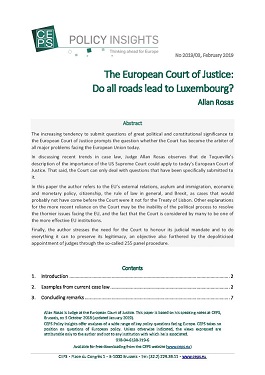The European Court of Justice: Do all roads lead to Luxembourg?
The European Court of Justice: Do all roads lead to Luxembourg?
Author(s): Allan Rosas
Subject(s): Politics / Political Sciences, Politics, Law, Constitution, Jurisprudence, International Law, Governance, Politics and law, EU-Approach / EU-Accession / EU-Development, EU-Legislation, Sociology of Law
Published by: CEPS Centre for European Policy Studies
Keywords: European Court of Justice; European Union; rule of law; Treaty of Lisbon; EU institutions; politics; court's legitimacy;
Summary/Abstract: The increasing tendency to submit questions of great political and constitutional significance to the European Court of Justice prompts the question whether the Court has become the arbiter of all major problems facing the European Union today. In discussing recent trends in case law, Judge Allan Rosas observes that de Toqueville’s description of the importance of the US Supreme Court could apply to today’s European Court of Justice. That said, the Court can only deal with questions that have been specifically submitted to it. In this paper the author refers to the EU’s external relations, asylum and immigration, economic and monetary policy, citizenship, the rule of law in general, and Brexit, as cases that would probably not have come before the Court were it not for the Treaty of Lisbon. Other explanations for the more recent reliance on the Court may be the inability of the political process to resolve the thornier issues facing the EU, and the fact that the Court is considered by many to be one of the more effective EU institutions. Finally, the author stresses the need for the Court to honour its judicial mandate and to do everything it can to preserve its legitimacy, an objective also furthered by the depoliticised appointment of judges through the so-called 255 panel procedure.
Series: CEPS Policy Insights
- E-ISBN-13: 978-94-6138-719-6
- Page Count: 8
- Publication Year: 2019
- Language: English
- eBook-PDF
- Introduction

